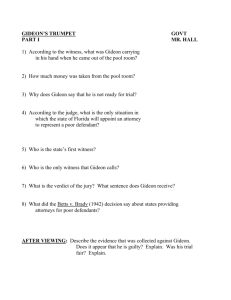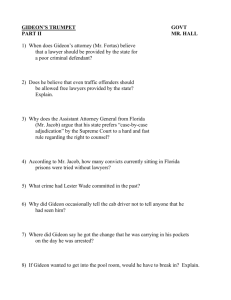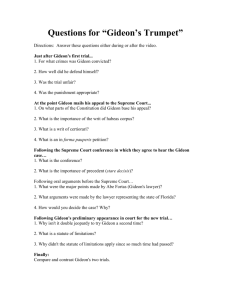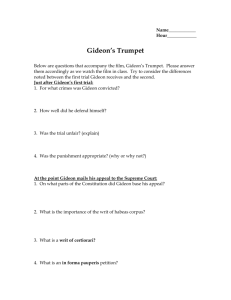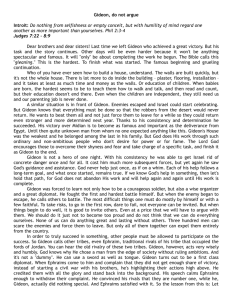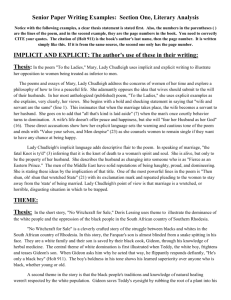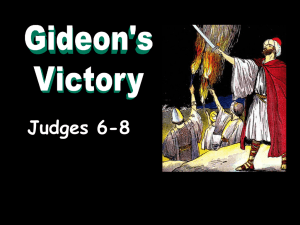5d - Judges 7, Gideon 2
advertisement
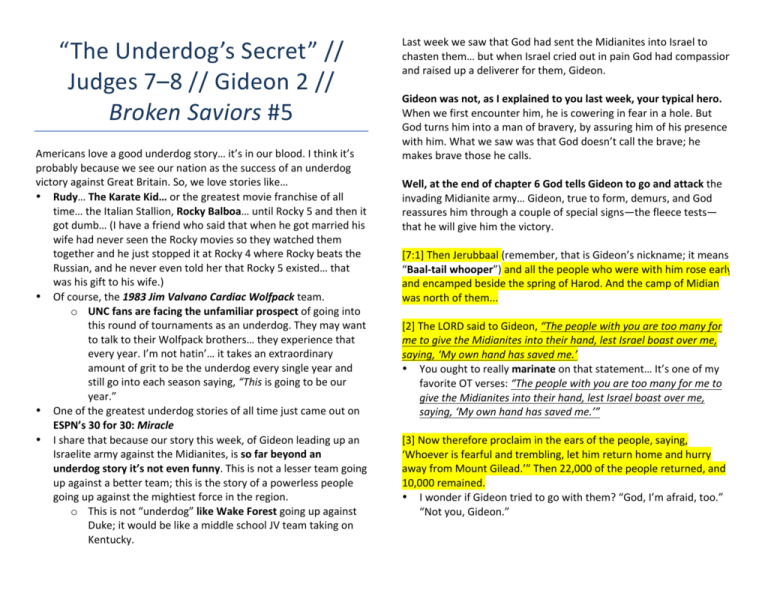
“The Underdog’s Secret” // Judges 7–8 // Gideon 2 // Broken Saviors #5 Americans love a good underdog story… it’s in our blood. I think it’s probably because we see our nation as the success of an underdog victory against Great Britain. So, we love stories like… • Rudy… The Karate Kid… or the greatest movie franchise of all time… the Italian Stallion, Rocky Balboa… until Rocky 5 and then it got dumb… (I have a friend who said that when he got married his wife had never seen the Rocky movies so they watched them together and he just stopped it at Rocky 4 where Rocky beats the Russian, and he never even told her that Rocky 5 existed… that was his gift to his wife.) • Of course, the 1983 Jim Valvano Cardiac Wolfpack team. o UNC fans are facing the unfamiliar prospect of going into this round of tournaments as an underdog. They may want to talk to their Wolfpack brothers… they experience that every year. I’m not hatin’… it takes an extraordinary amount of grit to be the underdog every single year and still go into each season saying, “This is going to be our year.” • One of the greatest underdog stories of all time just came out on ESPN’s 30 for 30: Miracle • I share that because our story this week, of Gideon leading up an Israelite army against the Midianites, is so far beyond an underdog story it’s not even funny. This is not a lesser team going up against a better team; this is the story of a powerless people going up against the mightiest force in the region. o This is not “underdog” like Wake Forest going up against Duke; it would be like a middle school JV team taking on Kentucky. Last week we saw that God had sent the Midianites into Israel to chasten them… but when Israel cried out in pain God had compassion and raised up a deliverer for them, Gideon. Gideon was not, as I explained to you last week, your typical hero. When we first encounter him, he is cowering in fear in a hole. But God turns him into a man of bravery, by assuring him of his presence with him. What we saw was that God doesn’t call the brave; he makes brave those he calls. Well, at the end of chapter 6 God tells Gideon to go and attack the invading Midianite army… Gideon, true to form, demurs, and God reassures him through a couple of special signs—the fleece tests— that he will give him the victory. [7:1] Then Jerubbaal (remember, that is Gideon’s nickname; it means “Baal-­‐tail whooper”) and all the people who were with him rose early and encamped beside the spring of Harod. And the camp of Midian was north of them... [2] The LORD said to Gideon, “The people with you are too many for me to give the Midianites into their hand, lest Israel boast over me, saying, ‘My own hand has saved me.’ • You ought to really marinate on that statement… It’s one of my favorite OT verses: “The people with you are too many for me to give the Midianites into their hand, lest Israel boast over me, saying, ‘My own hand has saved me.’” [3] Now therefore proclaim in the ears of the people, saying, ‘Whoever is fearful and trembling, let him return home and hurry away from Mount Gilead.’” Then 22,000 of the people returned, and 10,000 remained. • I wonder if Gideon tried to go with them? “God, I’m afraid, too.” “Not you, Gideon.” • Now, this may have been a smart move. You could make the argument that 10,000 brave soldiers are better than 32,000 where 2/3 are wimps. But the next part makes absolutely no sense…. • [4] And the LORD said to Gideon, “The people are still too many. Take them down to the water, and… “Every one who laps the water with his tongue, as a dog laps, you shall set by himself. Likewise, every one who kneels down to drink.” [6] And the number of those who lapped, putting their hands to their mouths, was 300 men… [7] And the LORD said to Gideon, “With the 300 men who lapped I will save you and give the Midianites into your hand, and let all the others go every man to his home.” • You say, “Oooh… what’s the symbolism in keeping the ones who lap like a dog?” Does this prove God loves dogs more than cats? Well, he does, but there’s no symbolism explained. Just a random test to get rid of 97% of the army. Think about this: God intentionally weakened Gideon’s army. There is so much to learn from that. 1. When God wants to use us, he often will weaken us. • • Why would God do that? Because God wants us to trust him, to depend on him. That’s the most important thing we can ever learn in life. o So sometimes God reduces the size of your army so you have no choice but to trust him. o You say, “What do you mean by ‘reduce the size of your army’?” Health; job; could even be your marriage. o I’m not saying God is the one destroying your marriage, just that God’s sovereign purpose behind it might be teaching you to lean into him like never before. Here is another statement to marinate on (given it before) — If dependence is the objective, weakness is an advantage. Think about that: How could you ever see weakness as an advantage? If weakness makes you lean into Jesus’ power. • • o You were no longer able to rely on your husband; the money from your job you always depended on was gone, and you had to look to God for provision. And then you learn a lesson that you could never have learned when those things were in place: GOD IS FAITHFUL. The Apostle Paul even said, “Therefore I will boast all the more gladly about my weaknesses, so that Christ's power may rest on me.” 2 Corinthians 12:9 • Brag about your weaknesses? “Here’s another place I’m ‘sub-­‐ par.’ Here’s another place I’ve failed.” But it was there he was able to put on display Christ’s power, not his own. • You see, if I brag on my strengths, you may sit there and say, “I wish I were more like him, but I can’t be.” But if I brag on my weaknesses, and tell you about what Christ’s power has done through them, you will say, “Wow, I have access to what he has access to!” • Effective preaching is one beggar telling a bunch of other beggars where to find bread. And maybe the best thing I can do to help you toward that is make you understand that I’m a beggar, too. Or let me show it to you in another place: 1 Peter 1:7 says that your faith (i.e. your confidence in God’s goodness and grace) is “more precious than gold.” o In whatever “battle” you are in, what is the greatest asset that you have? In the battle to provide for yourself, is it your ability to make money, or your drive in life? In your battle for your family, is it your ability to parent? o According to Peter, the greatest asset you can have in any situation is faith in God’s goodness… o Elyse Fitzpatrick, who will be speaking here with me on Mother’s Day… Give them Grace: how many books on parenting, Christian books, that guarantee success in parenting if you just follow these Biblical points… § However: She points out that God was a perfect father and 1/3 of angels and the two humans he created left… She’s like, “So, you think you’ll be • • • able to out-­‐technique God?” o She says the really dangerous problem with thinking there is a foolproof way of parenting is it keeps us from the one thing we most need, to cast ourselves on the mercy of God to work in our kids’ lives, which is the one thing he responds to. Not perfect technique, but hope in his mercy... What keeps us from hope in God’s mercy is our strength. This is one of the most important spiritual truths you can ever learn: your strengths are more dangerous to you than your weaknesses, because your strengths keep you from hoping in God’s mercy. o To be saved means to come to a point where you know you can’t save yourself and you fall on the mercy of God. o To be used by God means you come to a point where you realize how absolutely impotent you are, and you fall in hope in God’s mercy. So God sometimes weakens us to bring us to that point. Write this down: “It is doubtful whether God can bless a man greatly until he has hurt him deeply.” A. W. Tozer1 He’s got to reduce the size of your army before you can experience his power. o He lets you fail (Two of the most growing seasons of my life came through failure: one was a failure in something I was trying to do; the other was a failure in my courage.) So, listen… I want you to rethink what God might be doing in your life. Maybe you are experiencing an army reduction right now… and I want you to be open to the essential lesson God is showing you in it. • I’ve told you the story of the LITTLE BIRD flying south for the winter. But he got a late start, so he got caught in a snowstorm. The storm was so bad that ice formed on his wings and he couldn’t even fly. He went down for a crash landing, and couldn’t get back up. He thought, “Great. Now I’m going to freeze to death.” But then suddenly a cow came and drops manure on him. The little bird is like, “Awesome… I 1 A. W. Tozer, The Root of the Righteous, 144. • am going to freeze here, and now I have manure dumped on me. But then the manure thaws his wings and he can fly again. When he realizes what is happening, he gets so excited that he started to chirp and sing. But this attracts a cat; who comes and eats him. We can learn 3 lessons from this story: o Lesson 1: Not everyone who drops manure on you is your enemy. o Lesson 2: Not everyone who digs you out is your friend. o Lesson 3: When you’re in manure, sometimes its helpful to keep your little chirper shut… Because God might be doing something amazing. “[God] wants you to have something far better than riches and gold, and that is helpless dependence upon him.” Hudson Taylor The second thing God is trying to teach us through the reduction of Gideon’s army is that… (and this is another common theme in Judges) 2. God would send salvation not through human might, but the weakness of humble obedience. • • I explained this before: Not only is each story in Judges teaching us, the book of Judges as a whole has a message for us… A rather odd trajectory is established in Judges o The book of Judges opens with Joshua, who was a mighty general in charge of a strong, Israelite army. o But then we have Ehud, a left-­‐handed, crippled leader… o After that there’s Deborah, a female judge, and the hero of that story is Jael, a housewife with a frying pan. o Now Gideon, whose army God has whittled down to 300! o In a few chapters, we’ll come to Samson, who fights all by himself… o And after the book of Judges, we come to David… a scrawny shepherd boy who writes songs and defeats a giant with a slingshot all alone while all of Israel stands on the sidelines and watches. • • • • • You see, we are going from strength to weakness. We like graphs that go up; this one is going down. This points us toward something really important. God would send salvation into the world not through a King who would conquer the world’s armies with a superior army, but by one who would lay down in his life in service and humility and obedience. Time and time again in Jesus’ life we are confronted with the weakness of Jesus. Going into the crucifixion, Jesus said it was the hour his greatest glory. Look at how he spent it: o He begins it by washing the disciples’ feet, the activity of the lowest form of servant there. o He was mocked, maligned and spit upon… o He’s so weak he can’t even carry his cross… someone has to help him o He dies with his hands stretched out, nailed to a cross, an ultimate picture of weakness. But through that, God brought a resurrection. This is how it happens. We humbly obey; God brings power. It’s the same for you. You faithfully obey, in your weakness: o You keep sharing Christ o You keep patiently parenting your child o You refuse to give up praying for lost son o You endure the scorn without getting retribution o And God sends a miracle. The Faithful Woodpecker • Well, God’s got Gideon’s army down to the size he needs it… [9] That same night the LORD said to him, “Arise, go down against the camp, for I have given it into your hand. [10] But if you are afraid to go down, go down to the camp with Purah your servant. [12] And the Midianites… lay along the valley like locusts in abundance, and their camels were without number, as the sand that is on the seashore in abundance. [13] When Gideon came, behold, a man was telling a dream to his comrade. And he said, “Behold, I dreamed a dream, and behold, a cake of barley bread tumbled into the camp of Midian and came to the tent and struck it so that it fell and turned it upside down, so that the tent lay flat.” [14] And his comrade answered, “This is no other than the sword of Gideon… God has given into his hand Midian and all the camp.” Don’t miss the humor here. The picture of Gideon is not of a mighty rock or a spear or a hurricane, but a piece of bread. What team chooses this as its mascot? We’re the “biscuits.” • But this biscuit flattens a tent. Now, I’m not much of a camper, and if you threw a piece of bread at a tent I set up, it just might fall over. But that wouldn’t happen to a normal tent. Gideon recognizes in this that God is reassuring him: [15] As soon as Gideon heard the telling of the dream and its interpretation, he worshiped. And he returned to the camp of Israel and said, “Arise, for the LORD has given the host of Midian into your hand.” The third thing we learn from this story is 3. God patiently deals with faltering faith • • I find it really comforting in this story how God takes such time and patience to reassure Gideon. We picture God as this one up in heaven saying, “If you don’t have absolute confidence in me all the time, I will reject you.” But that’s not what we see here, is it? o Mark 9:22, a man with a sick son came to Jesus and says, “Jesus, if you are able to do something, have pity.” I would expect Jesus to respond with an “If…? What’s wrong with you? Don’t you know who I am?” Instead he says, “Everything is possible for those who believe.” The man’s response: “I believe, help my unbelief.” Now, at this point, if I were Jesus, I would have said “Well, a double-­‐minded man is unstable in all his ways. Go memorize some Scripture and come back when you’re ready to go all-­‐in.” Jesus’ response: he healed the boy. Do you doubt? It’s ok. Ask your questions. Ask God to reveal his faithfulness to you. • But also consider #4… 4. At some point, you have to take the risk • • • • Think about what is going on in this scene. Gideon is afraid, and God is trying to reassure him. So God tells him to go deep into the MIdianite camp, close enough to overhear a conversation in a Midianite tent… o If I were Gideon, I would have said, “Hey, God, maybe you could give me that assurance out here? We could use the fleece again… I’ll close my eyes and count to 10, and when I open them maybe you could have folded it up into a paper airplane or something…. I don’t know if you get this or not, but I’m afraid, so the last thing I want to be doing is sneaking alone into the Midianite camp at night.” What the lesson? God will patiently develop your faith, but it requires you taking steps of your own. Here’s how faith works: God reveals a little, you take a step. God reveals a little more; you take a step. Scripture says, “Draw near to God, he will draw near to you.” If you are waiting on God to answer all your questions before you’ll believe, you’ll never get there. Take that first step, and he’ll explain more as you go. o We’ve all heard of birds that teach their young to fly by pushing them out of the nest. The mother bird knows the little bird is ready to fly. (Think of that from the perspective of the bird!) So Gideon divides the men into 3 companies of 100 each, and gives each one a trumpet, a jar and a torch. He tells them, “Light your torch and put it in the jar. Then we’re going to line the valley wall, and when I blow my trumpet, each of you are going to blow yours and then smash your jar and raise your torch.” They waited until, vs. [19]… at the beginning of the middle watch, when they had just set the watch. [20] Then the three companies blew the trumpets and broke the jars. They held in their left hands the torches, and in their right hands the trumpets to blow. And they cried out, “A sword for the LORD and for Gideon!” [21] Every man stood in his place around the camp, and all the army ran. They cried out and fled. [22] …the LORD set every man's sword against his comrade and against all the army. So here’s how this worked. Usually, a torch and a trumpet signified a whole battalion. And the smashing of the jars would have sound like hundreds of thousands of swords being raised. So, in the dark, this wouldn’t have seemed like 300 men, it would have seemed like tens of thousands. They did it at the beginning of the middle watch, which means that 1/3 of the Midianite army was returning into the camp from being on guard duty; 1/3 were getting up to go out on duty; and 1/3 were still fast asleep. Well, just at the moment the Israelites blow their trumpets, smash their jars and all these torches appear. Everyone is groggy, it’s dark, and you have what seems like thousands of soldiers lining the canyon above you. And a bunch of soldiers are coming abck into the camp, so you assume that these people coming back into the camp are attacking you, and, in the dark, they all kill each other. The end. And they all live happily ever after… except for the Midianites, of course. But not a single Israelite casualty. 5. God can turn weakness itself into strength Now, let me point out something cool here… God never explained to Gideon how to conduct this battle. Gideon seems to come up with this on his own out of his own cowardly noggin’. God’s reduction forced him to come up with a new plan, and it was a better plan—because it resulted in a victory that didn’t cause a single Israelite casualty. So Gideon’s weakness actually became the source of his strength. Often, in weakness, God can reorganize your whole life, for the better! “TELL A BETTER STORY.” What he wanted was a fix for this… Conclusion: 6. Join Jesus wherever he is Christianity begins with, “I’m not righteous enough to save myself.” It continues with, “I need God’s power for every good thing in my life.” How are you on that journey? • Maybe God has been bringing you to a moment of weakness and maybe you sense some of what he’s been trying to teach you? o I’ll be your security. I’ll be your ever-­‐faithful companion. I’ll be your justification and your righteousness. Your glory, the lifter of your head. • Or maybe God has delivered you from weakness in the past, but now you feel yourself walking in sufficiency and less dependent on God? • Or maybe you’ve never begun that journey… you’ve never realized how hopeless you are without God. o The two things you can never overcome on your own are sin and death. You can’t release yourself from the curse of sin or deliver yourself from the power of death. o Jesus did both of those for you. He died in your place suffering the curse for your sin and overcame death for you in his resurrection. o You have to receive that, confessing your weakness and acknowledging that Jesus did for you what you couldn’t do for yourself and receiving it from as a gift. o Have you ever done that? Would you like to? • • • • Gideon’s whole life can be summarized, to me, as “Join Jesus where he is.” With Jesus, before an enemy as numerous as the sand of the seashore with an army of your own of only 300 is better than anywhere without him. Christian maturity is when you learn to say: I’ll go anywhere with Jesus and wouldn’t want to be anywhere without him. The mature Christian values obedience above all, because they know Jesus + nothing = everything. They say, “In Christ, I can give up all that I have because in Christ, I already have all that I need.” So the question, God, is where do you want me? I want to be with you. “All God's giants have been weak men who did great things for God because they reckoned on God being with them.” Hudson Taylor Well… Gideon’s story doesn’t end well. At the end of his life, he seems to get proud… his power and success go to his head—he starts reading his own press releases—he makes an idol commemorating his victories and the Israelites start worshipping it too. And he starts using his position for personal vendettas. You’ll have to come back for that next week, but for right now I just want to say… never get out of your position of weakness. When you get strong, and think to yourself, “I have all that I need,” that’s when you fall apart. Never forget where you were when God found you; or the grace he showed to you and how much you owe to that grace… Beware that after the greatest spiritual victories you can slide right back down into the hole from whence you came.
